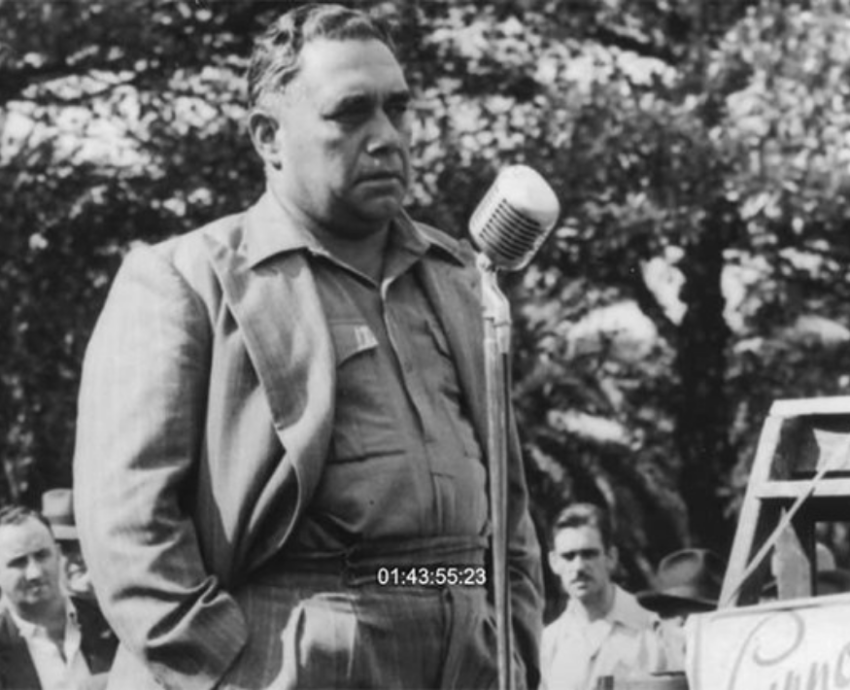
Ablaze
Written and directed by Tiriki Onus and Alec Morgan
In cinemas
Ablaze tells the story of Bill Onus, Australia’s first Indigenous filmmaker and a little-known but significant cultural and political figure.
It is a superb documentary created by Onus’s grandson, Tiriki and award-winning documentarian Alec Morgan, whose ground-breaking Lousy Little Sixpence is regarded as a touchstone of Australian cinema.
Onus was born at the Cummeragunja Aboriginal Reserve in New South Wales and lived an extraordinary life as a shearer, wharf labourer and theatrical impresario. He was a major figure in the 1967 referendum campaign for recognition of Aboriginal people as part of the Australian population.
He grew to love film making but the treasure trove of his work was lost in a fire. All that remains is a nine-minute-long fragment discovered in the National Library Sound and Film Archive.
When the film came to the Archive, there was nothing indicating where it came from or who had made it. It also lacks a soundtrack.
The film shows an Aboriginal man in a WWII Army uniform walking down a street and talking with some Aboriginal women in a doorway. There are shots of terrible living conditions of Aboriginal families in inner-city slums, an Aboriginal man working as a conductor on a Melbourne tram, an Aboriginal man demonstrating culture to Aboriginal youths and scenes from a theatrical performance.
The Archive approached Morgan with the film fragment. Acting on a hunch, he showed it to Tiriki Onus.
Speaking to Green Left, Tiriki said he was “floored” and “amazed” by what he saw.
“I saw Bill and I saw my uncle, Eric. I saw all of my family. I saw all of these communities here in Little George Street in Fitzroy exhibiting such strength and resilience and vitality.”
“That was totally at odds to the narrative of Aboriginal Australians in the 1940s that was being perpetuated out there in the world. Here was a people defined by its own sovereignty, ingenuity and power.”
Researching from that meagre source Onus and Morgan were able to discover that the piece was part of a longer, lost film that demonstrated the racist reception of Aboriginal returned WWII servicemen, including a war hero who gained work on the trams but was driven out by racism.
The film was also linked to a New Theatre production Bill Onus produced in solidarity with the Pilbara pastoral workers strike — the longest strike in Australian history that began in 1946.
These facts and others that frame the story, allow the film makers to expand the narrative to present a panorama of the Aboriginal freedom struggle.
Intriguing gaps remain, mostly because in the Cold War era progressive activists like Onus kept their names off controversial film projects, such as Indonesia Calling, the solidarity film produced by the Waterside Workers Federation, of which he was a member. Was Onus involved? We will never know.
What is known is that Onus led the Melbourne May Day procession, which was an extraordinary honour, one reserved for significant working-class activists.
Morgan told GL that Onus was one of the first to come under surveillance by the Commonwealth Investigation Service, the forerunner of the Australia Security Intelligence Organisation (ASIO). “Bill, in 1946, was really targeted by them,” he said.
“ASIO just took over the file, so Bill had an ASIO file until he died. Then that same file was passed onto Tiriki’s father, so the same file has Tiriki’s father’s name on it.”
Morgan said ASIO was interested “because he was outspoken, and he was talking at meetings”.
Onus took on the organisation of the 1967 referendum campaign in Victoria. “Around Melbourne, Bill was seen as the face of the ’67 referendum,” said Tiriki.
“To this day some of the most famous images of the campaign in ’67 feature Bill,” he said, though Onus was “more concerned that something would happen rather than he would get the credit for it”.
Onus acted in and played a cultural advisory role in the making of the famous 1946 film The Overlanders. He was a significant theatrical producer showcasing Aboriginal talent and successfully ran several businesses.
In researching and making Ablaze, Onus and Morgan have brought to light an inspiring account of one of Australia’s great Indigenous and working-class leaders.
The trailer for Ablaze can be seen here.